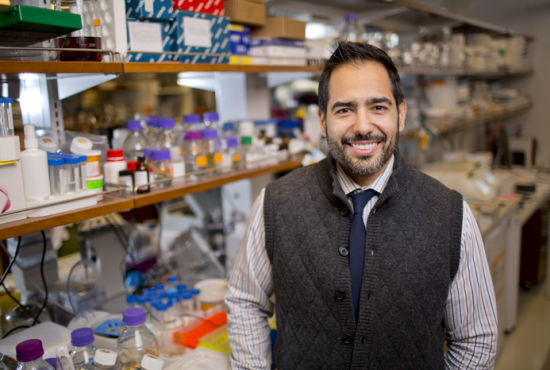Weill Cornell Medicine Receives Cancer Grand Challenges Award Focused on Cachexia
JUNE 29, 2022

Dr. Marcus DaSilva Goncalves. Credit: John Abbott.
Weill Cornell Medicine, Rutgers Cancer Institute of New Jersey and Cold Spring Harbor Laboratory have received a $25 million Cancer Grand Challenges award to tackle cancer cachexia, the debilitating wasting syndrome that is responsible for up to 30 percent of cancer-related deaths.
The team is one of four global teams being funded this year by Cancer Grand Challenges, which was founded in 2020 by Cancer Research UK and the National Cancer Institute, part of the National Institutes of Health, in the United States to invite diverse teams to come together, think differently and take on some of cancer’s toughest challenges.
“We are honored to be to be selected for this award from among many great applications,” said co-leader Dr. Marcus DaSilva Goncalves, the Ralph L. Nachman Research Scholar, an assistant professor of medicine in the Division of Endocrinology, Diabetes and Metabolism and an endocrinologist at NewYork-Presbyterian/Weill Cornell Medical Center. “With this support, we will be able to shed light on the mechanisms underlying cachexia in cancer, with the ultimate goal of finding effective treatments for the debilitating condition.”
Cachexia is an untreatable and poorly understood condition that is characterized by extensive weight loss from both skeletal muscle and fatty tissue and accompanied by fatigue, organ and tissue dysfunction, and greatly diminished quality of life. It’s often a sign of disease, such as AIDS or heart failure, or in this case, cancer.
“If you have cancer and weight loss, the reasons for that weight loss can be very divergent,” said Dr. DaSilva Goncalves, who is also a member of the Sandra and Edward Meyer Cancer Center at Weill Cornell Medicine. “Cachexia is not a single entity, and in fact, includes multiple subtypes.” To make progress, researchers must first define those subtypes and then attach relevant preclinical models -- mouse models or fruit flies, for example -- to them, he said. This is crucial because a preclinical model that mirrors anorexia, for example, is not going to be appropriate for understanding a patient population that has high metabolism due to inflammation.
Researchers hypothesize that cancer cachexia stems from a complex set of interactions between tumor cells and the rest of the body, through metabolism and the immune, endocrine and central nervous systems.
Dr. DaSilva Goncalves is co-leading a team with Dr. Eileen White from Rutgers Cancer Institute of New Jersey and Dr. Tobias Janowitz from Cold Spring Harbor Laboratory called the CANCAN (Cancer Cachexia Action Network) team. It consists of clinicians, patient advocates and scientists with expertise in cancer, metabolism, neuroendocrine function, immunology and more from 14 institutions across the United States and the UK.
With the Cancer Grand Challenges funding, the CANCAN team aims to build the world’s first multidisciplinary virtual institute with a mission to cure cancer cachexia. Within the institute, team members will lead four main projects to understand how cancer changes metabolism; how a tumor interacts with its surroundings and which factors may be leading to wasting; how the tumor affects appetite and mood; and how people with cancer experience cachexia in a clinical context, using large set of patients with lung, pancreatic, and colon cancer who are at high risk for cancer cachexia.
“Cachexia is one of the top three concerns of patients when they present to their oncologist. And it's the number one concern of family members. You can imagine having a loved one with cancer and watching them waste away can be quite devastating,” Dr. DaSilva Goncalves said. “And so, preventing that from happening would first, improve quality of life. That in turn would increase the response and duration of cancer therapy because most people stop their anti-cancer therapy because they’ve lost too much weight. And lastly, it could improve overall mortality. So, we’re excited to get going and make an impact.”
###
Contact
Alyssa Sunkin-Strube
Newsroom Manager
Weill Cornell Medicine
Office of External Affairs
1300 York Ave., Box 314
New York, NY 10065
T 646.962.9540
F 646.962.0123
als2062@med.cornell.edu
Twitter: @WeillCornell
Facebook: WeillCornellMedicine
Source: https://news.weill.cornell.edu/news/2022/06/weill-cornell-medicine-receives-cancer-grand-challenges-award-focused-on-cachexia
"Reproduced with permission - "Weill Cornell Medicine"
Weill Cornell Medicine
For more HIV and AIDS News visit...
Positively Positive - Living with HIV/AIDS:
HIV/AIDS News |